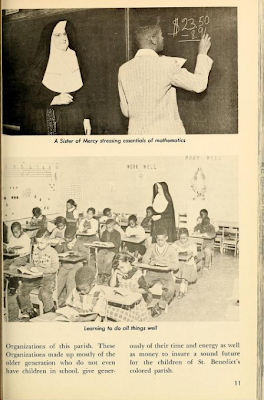"As we believe, the most important item about a school is its curriculum and therefore, we have introduced to you first this important subject. You will find following this introduction a separate list of these all important Christian Social Principles." (vii-viii)
After an explanation of Christian Social Principles, the book launches into a discussion on the core of Catholic education:
"The answer is, those which deal primarily with man's basic relationships.
Religion Social Studies Science
(Relationship to God) (Relationship to Fellowman) (Relationship to Nature)Looking back to our social teachings, it is evident that the three subjects above compromise the core of Christian education.
All Subjects
(Relationship to Self)
Physical fitness
Economic competency
Social virtue
Cultural development
Moral and spiritual perfection
The complete picture above can produce the integrated personality that only Catholic education can produce." (x)
The contributors to this work are occupied with the concept of part-to-whole and a conscious formation of personal unity through education in order to perfect a harmonious, holistic self. There are seven pages extracted from a previous teaching guide that explain how a person can interact in a Christlike way at home, school, the parish, the community, work and recreation!
Some of my favorites:
School
Community
Work
Recreation
For anyone interested in religious education, this item is a goldmine of information. It combines both educational theory with practical facts on schools across North Carolina. The book profiles many schools all the way from elementary to collegiate level. Additionally, there are several black and white photos included of the school buildings, classrooms and students and teachers. The final section of the book shows some authentic examples of Catholic school curricula as well as enrollment statistics from 1941-42 to 1957-58.
If you're interested in religious education in particular, check out a few related materials: History of Catawba College (1927), A long range program for campus development : proposed Fayetteville Methodist College, Fayetteville, North Carolina (1957) and A history of Sunday school work in the North Carolina Conference, Methodist Episcopal Church, South (1925).
There is also a neat serial on a theological seminary slated for possible digitization in the near future. I hope we are able to get it live on the Internet Archive soon. The serial spans from the 1950s to the 1980s, so it is interesting to see how it evolves in content and structure. Although skimming through thick sets of bound serials can be daunting, I enjoyed observing the changes in course offerings and professors, how the information was arranged, which details were added and which were taken away over time and so on. The contributors to this work are occupied with the concept of part-to-whole and a conscious formation of personal unity through education in order to perfect a harmonious, holistic self. There are seven pages extracted from a previous teaching guide that explain how a person can interact in a Christlike way at home, school, the parish, the community, work and recreation!
Some of my favorites:
School
- "School life is a vocation not a mere preparation for life." (xi)
Community
- "The American democratic way of life is in accord with Christian teaching." (xiii)
- "Order is a necessary means to Christian social living." (xiv)
Work
- "The Seventh Commandment binds the worker and the employer." (xiv)
Recreation
- "Proper evaluation of the gift of speech." (xv)
- "Recreation is a means of self-fulfillment rather than an escape." (xvi)
- "Regard for modesty as a requisite for charms." (xvi)
If you're interested in religious education in particular, check out a few related materials: History of Catawba College (1927), A long range program for campus development : proposed Fayetteville Methodist College, Fayetteville, North Carolina (1957) and A history of Sunday school work in the North Carolina Conference, Methodist Episcopal Church, South (1925).
Check regularly for new materials added each month!
All images from Catholic education in North Carolina (1958).




No comments:
Post a Comment